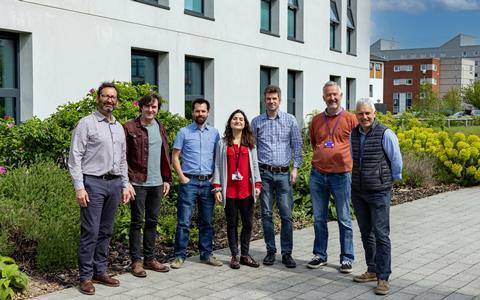Agri-tech innovator’s potato disease detection system enters advanced testing phases

Root crop disease and defect monitoring system TuberSense – under development by agri-tech business B-hive Innovations - has entered its next project phase to revolutionise how technology can anticipate issues in tubers before the crop loses its quality and value.
Future Leaders Fellow Dr Barbara Correia secured funding from UK Research and Innovation (UKRI) in Summer 2021, and since then has been conducting the first phase of research, development and testing with the wider project team, including potato producer Branston Ltd and research institutions.
Correia’s initial research to define the link between potato diseases and volatile compounds released by the tubers was carried out with UWE Bristol and the James Hutton Institute, while the University of Warwick has partnered on the project to develop gas sensors to measure the gases produced.
Following a series of first-phase trials, the R&D sensing system has now been developed to use volatile biomarkers as means of detecting crop diseases and defects that can cripple potato supply chains, including soft rot, dry rot and black heart in potato tubers.
Correia said: “The first phase of our research has provided us with tremendous novel insights into the range of diseases and defects that, unless detected early, can enormously compromise the overall quality of the crop that enters the supply chain.
“Through the first project phase, we have gained a great understanding of which diseases are most distinguishable through the use of gas sensing technologies.
“Conversely, we have also become more aware of which defects may not be detectable through such means, which already gets us thinking of other ways that we might detect those defects at an early stage.”
To ensure optimal testing conditions, Correia and the team have been conducting experiments using a mix of field testing with growers alongside semi-controlled trials, including the use of industrial shipping containers.
The team has also shipped a TuberSense system to a sweet potato supplier in North America for further testing, as the project looks to expand the breadth of crop the technology can be compatible with. Sweet potatoes can be even more susceptible to disease and defects, especially considering long shipping times, and therefore there is a higher rate of crop wastage.
To better understand the demand from growers, the research team embarked on a 12-week Scaling the Edge project funded by with UKRI. Three quarters of the growers faced disease and defect problems with their crop, and the majority of these are keen that a gas sensing system for early detection is made available.
With the first phase of the project now nearly completed, the team is starting to develop the second iteration to feature an improved gas sensor, with aims to commence testing with units by the end of the year.
Correia added: “Research and development combined with market research has made it clear that growers and packers of root crops require greater insights into disease and defect detection at the earliest point possible.
“While we have made some great breakthroughs during the first phase of the project, we have a lot of confidence from our ongoing analysis to trial a 2.0 iteration - that will extract even more insights into using volatile markers for gas sensing in stored crop.
“By undertaking detailed data analysis, we believe that we can detect some tuber diseases and defects more accurately through further refinements to the underlying technology, and we are working through making those changes.
“We are also exploring technology from other partners. This includes graphene-based sensors from Altered Carbon, who we have partnered with recently, alongside our own bespoke sensor array to see how much we can push the limits of sensitivity of the system.
“By the end of the project, we want to be in a position where our findings can inform the production of commercial detection systems for the industry.”
If you would like to support the project, the TuberSense team is asking different players of the fresh produce industry to contribute with their views by filling in the following questionnaire below (which should take 5-10 minutes to complete) to help it achieve the highest impact for its R&D efforts: https://survey.sogolytics.com/r/K3Vfy1
B-hive Innovations is an agri-tech R&D business based in Lincoln. B-hive develops innovative technologies for fresh produce industry to increase marketable yield, better crop utilisation, adding new value and reducing food waste in the supply chain.



